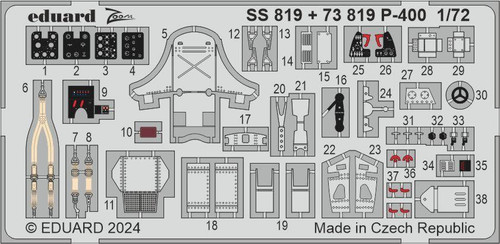Description
70057 P-400 Airacobra
1/72 scale P-400 Airacobra plastic model kit
Kit content:
- plastic parts
- 3D-printed resin fuselage nose
- canopy and wheel masks
- decals with three markings options (USA)
- steel balls for nose weight
Camouflage and marking options:
- P-400 Airacobra „white 13” „Wahl Eye”, 39FS/35FG, pilot Lt. Eugene A. Wahl, Port Moresby, New Guinea, Summer 1942
- P-400 Airacobra „white 19”, AH736, 80FS/8FG, Turnbull Airstrip, Milne Bay 1942
- P-400 Airacobra „white 13” „Hells Bell”, BW151, 67FS/347FG, pilot Lt. Robert M. Ferguson, Guadalcanal, August-November 1942
P-400 Airacobra Fighter
The P-400 is a variant of one of the World War II most interesting and innovative fighters: the P-39 Airacobra. Bell designers equipped Airacobra with a front wheel, an engine in the centre of gravity of the airframe and a solid 37 mm cannon. The engine was originally equipped with a turbo-supercharger, which provided the prototype flown in the spring of 1939 with excellent performance at high altitudes. However, US aviation officials preferred less-complex propulsion, fit to operate at a lower altitude. The implementation of Airacobra into mass production and combat units coincided with the rapidly changing circumstances related to the outbreak of war in Europe, and then on the Eastern and Pacific fronts. With the advent of more effective aircraft types, more than half of the 9,558 produced Cobras were sent under Lend-Lease to the Soviet Union, where the aircraft performed excellently: battles were fought at the low altitude for which the Airacobra was best suited. Of the top 10 Soviet aces, half flew Airacobras.
The export version of the Airacobra was created before the US entered the war, on French and British orders. It was distinguished by being armed with a 20 mm cannon instead of a 37 mm one and by twelve exhaust tubes on each side of the engine. In the RAF, the plane was named Airacobra I. Due to the lack of a supercharger, it was too weak to fight the Luftwaffe, so the British quickly withdrew it from service.
After the Japanese attack on Pearl Harbor, the US government requisitioned many of the machines produced for the RAF, retaining their unusual equipment and even British camouflage and serial numbers. The planes were named P-400 and were urgently sent to fight in the South Pacific. Also, some of the fighters already delivered to Britain were taken over by the USAAF and used in combat in North Africa. Later, many P-400s went to the USSR.



















